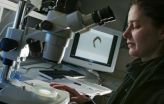(Press-News.org) WASHINGTON, D.C. — Introductory college science classes need to improve their coverage of issues related to sustainability, a noted chemistry educator told the American Association for the Advancement of Science today.
"Across the nation, we have a problem," said Catherine Middlecamp, a distinguished faculty associate in chemistry at the University of Wisconsin-Madison. "We are using a 20th-century curriculum, and this is the 21st century."
Students, Middlecamp says, want a curriculum that will prepare them for upcoming challenges related to climate change, pollution and environmental health.
"You can see, from the questions they ask, the volunteer projects they undertake and the papers they write, that they are intensely concerned about the fate of the planet and the living realm. And because many of our students will not be taking another science course, it's vital that our introductory courses prepare them for their future," she says.
Middlecamp discounts the idea that a focus on sustainability will make courses less rigorous. "The chemical equation I balanced in 1968 is still balanced the same way today, but when I teach about energy, air quality or climate change, the data and the interpretations are changing all the time. They are a moving target," she says.
Rather than being watered down, "teaching in context, teaching that is connected to the real world is actually tougher," Middlecamp says, "because the curriculum that some consider rigorous actually has most of the answers in the back of the book, whereas we are dealing with issues where we don't know the exact nature of the question, much less what the best answers will be."
Middlecamp supervised the new edition of "Chemistry in Context," a textbook published by the American Chemical Society, and wrote its new chapter on sustainability. She has taught introductory chemistry at UW-Madison for 30 years.
In her courses, Middlecamp must teach the basics about chemical reactions and bonding, but to that she adds key concepts for environmental sustainability, such as the carbon cycle and the nitrogen cycle.
"Here's a key concept: Everything comes from somewhere and goes somewhere," she says.
Elise Niedermeier, who took Middlecamp's introductory chemistry class in 2007 and is now in graduate school at the University of Minnesota, says, "I was struck by the way [Middlecamp] connected her lessons to everyday life. Her enthusiasm and expert teaching made the material she presented on sustainability compelling and easy to link to everyday life."
Middlecamp notes that sustainability allows her to approach standard chemistry topics from new directions. "A class can start by discussing pollution from diesel engines, and still cover bonding and how to balance chemical reactions. At the same time, it satisfies a desire to learn about energy and air quality," she says.
The real world — and its future — are always on Middlecamp's mind as she teaches. "A chemistry course ought to be the start of a conversation, not the end of one," she says. "Often, the response I get is, 'Thank you for teaching a course that connects with my life today and the kind of things I will be doing, and for caring about for the rest of my life.'"
Change in the curriculum could be coming faster, Middlecamp says. "It takes time to change a course, especially one that is taught at a large university to thousands of students each semester, but colleagues are definitely thinking about this," she says. "These topics are exciting, timely and urgent, and these changes would benefit not only the discipline, but also our students and the university. It's not a choice between teaching content or teaching in context. We can do both, and we must do both.
"Students are looking to make the world a better place, and we need to do what we can to help."
###
— David Tenenbaum, 608-265-8549, djtenenb@wisc.edu
END
Cost-effectiveness analysis should play a bigger role in the American health care system, argued a University of Chicago researcher Friday at the annual conference of the American Association for the Advancement of Science.
"The effects of science and technology on health care costs depend on the policy context in which those technologies are developed and applied," said David Meltzer, Associate Professor of Medicine, in his presentation, "Policies to Mobile Technology and Science for Health Care Cost Control."
Meltzer, who also holds a PhD in economics, pointed out ...
Adelaide researchers have taken a step closer to the development of a universal flu vaccine, with results of a recent study showing that a vaccine delivered by a simple nasal spray could provide protection against influenza.
University of Adelaide researcher Dr Darren Miller and colleagues have successfully trialled a synthetic universal flu vaccine in mice. The results have appeared this month in a paper in the Journal of General Virology.
"Current flu vaccines rely on health authorities being able to predict what the forthcoming viral strain is going to be, and reformulating ...
TUCSON, Ariz. (February 18, 2011) -- A University of Arizona College of Engineering researcher and his team who are developing intelligent robots for planetary exploration will be featured in a segment of an upcoming episode of the science program "WaveLengths."
The robots will be featured on the episode premiering Thursday night, February 24 at 8:30 p.m. MST on public television KUAT Channel 6. "WaveLengths" is a quarterly science program hosted by BIO5 Institute Member Dr. Vicki Chandler.
The exploration robots are part of a tier-scalable, reconnaissance system prototype ...
A study by the University of the Basque Country (UPV/EHU) has carried out the first Spanish study into the emotional differences between the sexes and generations in terms of forgiveness. According to the study, parents forgive more than children, while women are better at forgiving than men.
"This study has great application for teaching values, because it shows us what reasons people have for forgiving men and women, and the popular conception of forgiveness", Maite Garaigordobil, co-author of the study and a senior professor at the Psychology Faculty of the UPV, tells ...
Patients who undergo elective orthopedic surgeries at high-volume, regional hospitals have better surgical outcomes and experience fewer complications than those who undergo those surgeries at local hospitals, according to research being presented by Hospital for Special Surgery investigators at the 2011 Annual Meeting of the American Academy of Orthopaedic Surgeons (AAOS).
These "regionalizers"—patients who travel to a regional, high-volume hospital—also tend to be younger, white, male and have private insurance, according to the research from Hospital for Special Surgery ...
Knee replacement surgery takes far more time to conduct in overweight and obese patients than in normal weight patients, according to recent research at Hospital for Special Surgery in New York. The study will be presented at the American Academy of Orthopaedic Surgeons annual meeting, held Feb. 15-19 in San Diego, Calif. The study has implications for hospital staff scheduling surgeries, operating room utilization and personnel staffing, and also raises the question of whether knee replacements should be reimbursed based on time.
"When we schedule surgery, the body mass ...
For years, doctors have used platelet rich plasma (PRP) to promote healing in various surgeries, but a recent study demonstrates that a type of PRP did not improve healing after rotator cuff repair. The study, conducted by Hospital for Special Surgery (HSS) investigators, will be presented at the upcoming American Orthopedic Society for Sports Medicine (AOSSM) 2011 Specialty Day meeting, held Feb. 19 in San Diego, Calif., following the annual meeting of the American Academy of Orthopaedic Surgeons.
"I would not recommend platelet-rich fibrin matrix [PRFM] as we used it ...
A new study has identified factors that predict the ability of a professional dancer to return to professional performance after hip arthroscopy surgery. The study by Hospital for Special Surgery investigators will be presented at the American Academy of Orthopaedic Surgeons annual meeting, held Feb. 15-19 in San Diego, Calif.
The results of this study indicated that ballet dancers were significantly less likely to be able to return to work compared with modern dancers or dance theater performers. Older age and having a variety of hip abnormalities also influenced outcome. ...
(Jena, Germany) Professor Dr. Michael Ristow's team along with Japanese colleagues from universities in Oita and Hiroshima have demonstrated by two independent approaches that even a low concentration of lithium leads to an increased life expectancy in humans as well as in a model organism, the roundworm Caenorhabditis elegans. The research team presents its results in the online edition of the scientific publication European Journal of Nutrition which is now online (see hyperlink below).
Lithium is one of many nutritional trace elements and is ingested mainly through ...
From The Royal Botanic Gardens, Kew, The University of Western Australia, and the, Kings Park and Botanic Garden, the scientists argue that deliberately increasing the frequency of fires may lead to ecosystem degradation and loss of biodiversity.
In a paper published this month in Trends in Plant Science they acknowledge that as climate change increases the combustibility of vegetation, human lives and property are more at risk.
However, they suggest that prescribed burning – a key practice by most environmental managers – may cause more problems because, they say, ...


